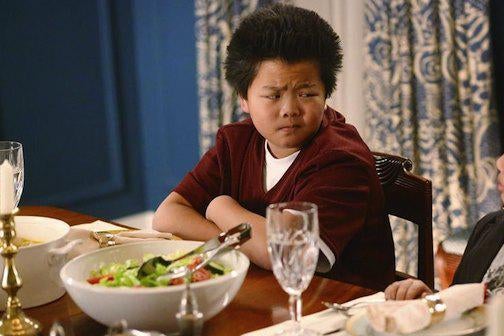It’s been a full two decades since prime-time television has seen an Asian American family sitcom. But ABC’s new show Fresh Off the Boat, loosely based on celebrity chef Eddie Huang’s memoir, is changing that. Though the very first Asian American family sitcom, Margaret Cho’s All-American Girl, was canceled due to poor ratings and lack of interest back in 1995, Fresh Off the Boat has already stirred up considerable buzz. It’s also a significant moment for many Asian Americans, who have largely been excluded or misrepresented when it comes to the mainstream.
But testing the waters won’t be easy for Fresh Off the Boat. Will the show resonate with a non-Asian audience? Will it manage to undermine stereotypes or end up reinforcing them? Will its jokes be lame?
So we wanted to discuss the series from an Asian American point of view. This week, Slate’s Jennifer Lai will be joined by Phil Yu, creator of the blog Angry Asian Man, along with Nicole Chung, the managing editor of The Toast.
Jennifer Lai: When a new Chinese kid transfers over to Eddie’s school, it seems like everyone—Jessica Huang, the school principal, and even Eddie himself—sees the potential for them to become fast friends. Even Philip Goldstein: He’s Chinese, but he’s also culturally Jewish, because he was adopted by Jewish parents.
Phil Yu: A lot of Asian American kids can relate to being paired up with the one other Asian kid by educators who thought they’d get along because, you know, Asian. It happened to me in the first grade. There was a new girl from Korea who didn’t speak a word of English, and the teacher made me sit with her. It was awkward.
Nicole Chung: I went to a super white parochial school for elementary school. Every now and then, a kid of color would transfer in, and then transfer out. I had a black classmate for about five minutes in fifth or sixth grade, around the time kids started “going out,” and everyone thought he and I should date. Because he wasn’t white, and I wasn’t either!
But as an adoptee, when I heard this episode touched on transracial adoption, I was just hoping that Phillip Goldstein wouldn’t BE the joke—that the laughs would come from some source that wasn’t “look at this kid who doesn’t know how to be Chinese because he’s adopted!”
Chung: But to me, the love and affection she showed for Phillip when she thought he was “a nice Chinese boy” makes it snap a little harder when she says that he’s not.
Yu: At least in the beginning, it seems that Eddie is hopeful they’ll get along because they’re both Asian. You could see Eddie imagining himself running with this kid, the start of a new crew at Abraham Lincoln Middle School. A new Asian crew.
Chung: The one line I keep circling back to is “You’re not a good Chinese boy,” and honestly, that is a really loaded line when it’s directed at an adoptee.
She could have just said, “You’re selfish, you’re not a good boy—Eddie is,” dropped the “Chinese” part, and it wouldn’t have stuck with me so much. But many transracial adoptees are already used to not being considered “_____ enough.”
Growing up as a Korean adoptee with white parents, I heard racial slurs from white kids; when I got to college and finally met other Asians, I got called a banana.
As an adoptee, watching that show, I kept wondering how I’d have felt seeing it as an adopted little kid.
Lai: Do you feel like the show has been illuminating to you as an adoptee, or that you’ve been able to identify with it as an Asian American, if you identify that way?
Chung: I’ve always identified as Asian American. I grew up in a place where I could never forget that I was Korean, you know? Even though my family was white. I love seeing Asian Americans, an Asian American family, on TV—it’s not my life or my exact experience, but it doesn’t have to be for me to want the show to be smart and thoughtful and successful. And I’m an adoptee who’s reunited with her Korean family, so there are some things I can identify with.
Yu: I think that’s a key to the show—that’s something a lot of people can relate to. Not just Asian Americans.
Chung: So many media portrayals of adoption just kind of skirt around this reality, or focus on “love being thicker than blood” or whatever adopted children have “escaped” from.
With his family, we saw that Phillip was Chinese but culturally Jewish, but he had no apparent issues or questions about that. So that’s the part I wonder about, even though I know the show is not about him.
Lai: If anything, Philip Goldstein was much more “Chinese” than Eddie—according to Jessica’s standards, at least. As she mentions, a “good Chinese boy” studies hard, plays violin (or cello) diligently, dresses appropriately, and never talks back to authority.
Chung: Jessica did have Phillip pegged as this ideal Chinese boy, which is a bit strange—she doesn’t even seem to register that the adoption would affect that, even though she marvels at the Goldsteins: “What a great family!”
Lai: But Jessica’s admiration for the Goldsteins really isn’t so surprising. Because the Goldsteins and the Huangs aren’t so different, actually—they seem to share the same values, at least.
Chung: At the end of the episode, though, Jessica judges Phillip for not meeting her expectations.
Yu: Well, she judges him for being a little asshole.
